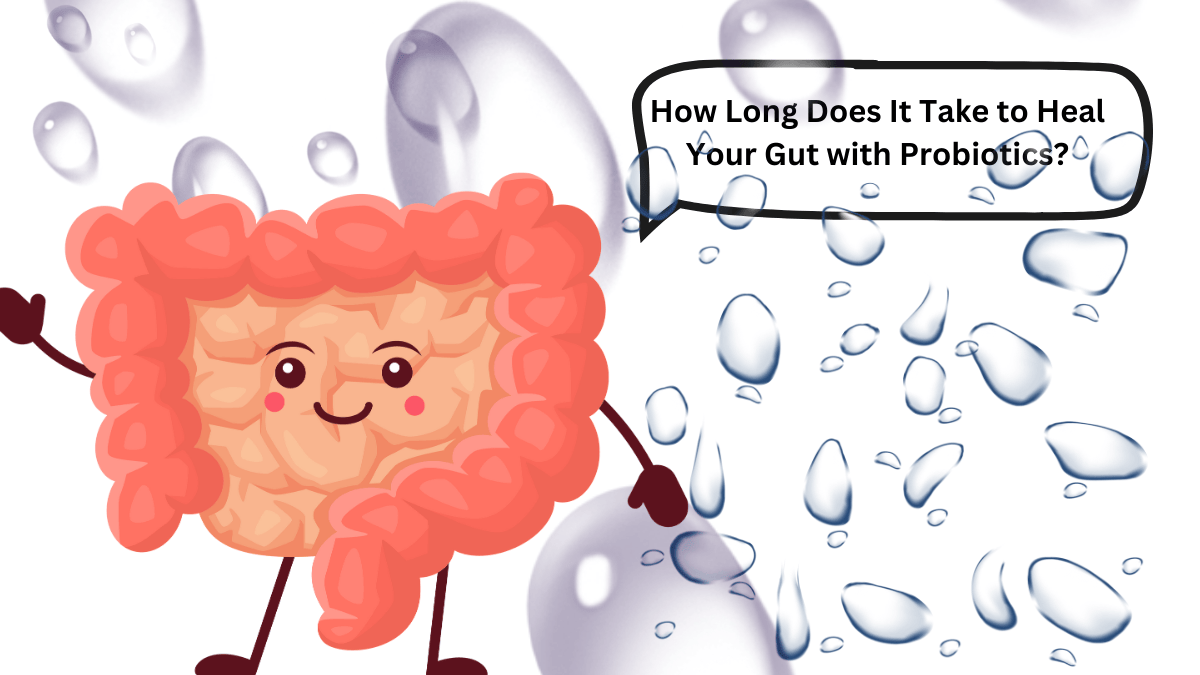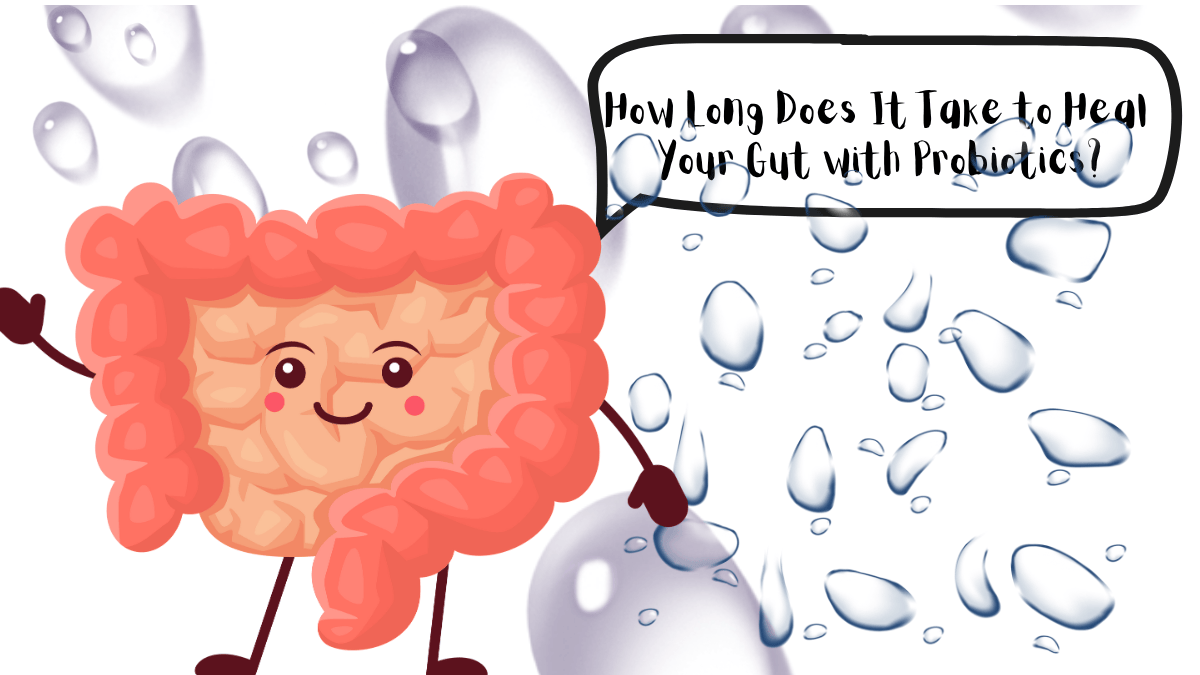Wondering how long it takes to heal your gut with probiotics? Discover the timeline, stages, signs of progress, and expert tips to repair your gut naturally with probiotic support.

Table of Contents
How Long Does It Take to Heal Your Gut with Probiotics?
Your immune system, mood, digestion, and even weight all depend on the health of your gut. How Long Does It Take to Heal Your Gut with Probiotics need some attention if you’re experiencing symptoms like fatigue, food sensitivities, bloating, or brain fog. Probiotics, those good bacteria, can help restore equilibrium to your microbiome. The big question, though, is how long does it really take for probiotics to heal your gut?
The response, however, differs! The state of your gut at the time, the type of probiotics you take, your diet, lifestyle, and how consistently you follow through all play a significant role. Everything you need to know about How Long Does It Take to Heal Your Gut with Probiotics will be covered in this comprehensive guide, including timelines, phases, helpful advice, and what to anticipate.
Why Gut Healing Takes Time
Trillions of microorganisms that are essential to immunity, digestion, and general health live in your gut. Gut dysbiosis, a condition where harmful bacteria outnumber beneficial ones, can result from a disruption of this delicate balance caused by processed foods, stress, antibiotics, or illness. It takes time to regain equilibrium.
The intestinal barrier gradually heals itself, so it may take weeks for a damaged gut lining (leaky gut) to heal. In the meantime, using probiotics, prebiotics, and a diet high in nutrients may need months of steady work to reverse dysbiosis. Prolonged inflammation slows down the healing process and makes recovery even more difficult.
The secret? perseverance and patience. Over time, a healthier microbiome can be restored by supporting your gut with whole foods, stress reduction techniques, and specific supplements. Keep in mind that genuine healing takes time.
How Probiotics Help Heal the Gut
Probiotics work in several powerful ways:
Rebalancing Microbial Diversity
Diversity is essential to a healthy gut. Probiotics, such as Lactobacillus and Bifidobacterium, help drive out harmful microorganisms by introducing beneficial bacteria. They improve immunity, digestion, and general health by promoting microbial balance. Consume foods or supplements high in probiotics to cultivate a more robust and resilient digestive system.
Strengthening the Gut Lining
Certain probiotic strains increase the production of butyrate, an essential nutrient that powers intestinal cells and fortifies the gut barrier, lowering permeability. Use specific probiotics to aid in gut healing for improved immunity and digestion.
Reducing Inflammation
Probiotics lessen gut inflammation, a major cause of digestive discomfort, and help balance immune responses. They encourage a healthier, more resilient gut by reducing irritation and boosting immunity.
How Long Does It Take to Heal Your Gut with Probiotics and see results
Timeline Overview
| Timeframe | What’s Happening in Your Gut |
| 1–3 Days | Initial microbial changes, minor digestive shifts |
| 1–2 Weeks | Reduced bloating, improved bowel regularity |
| 3–4 Weeks | Noticeable mood, energy, digestion improvements |
| 2–3 Months | Gut lining repairs, reduced food sensitivity |
| 3–6+ Months | Full microbiome rebalance and sustained health |
How Long Does It Take to Heal Your Gut with Probiotics ?Phases of Gut Healing with Probiotics
Phase 1 – Microbiome Introduction (Week 1)
You’re introducing beneficial bacteria. Gas and other minor discomforts are common.
Phase 2 – Detox & Die-Off (Weeks 2–4)
Negative bacteria disappear. You might experience fatigue, rashes, or flu-like symptoms.
Phase 3 – Regeneration (Months 1–3)
Gut lining recovery, decreased inflammation, and enhanced nutrient absorption
Phase 4 – Balance & Maintenance (3–6+ Months)
With steady energy, stable mood, and improved food tolerance, you’ll feel your best.
Factors That Influence Healing Time of your Gut
- Severity of gut imbalance
- Type and quality of probiotic strains
- Consistency of use
- Diet (anti-inflammatory vs. processed)
- Sleep and stress management
- Prebiotic intake (fiber feeds probiotics)
Signs Your Gut Is Healing
1-Physical Signs :
Regular, easy digestion, less gas and bloating, fewer acid reflux episodes, and clearer skin are all observable benefits of gut health. These alterations indicate that inflammation is declining and your microbiome is rebalancing. Even though recovery takes time, these encouraging changes show you’re headed in the right direction. For long-lasting gut health, aid in the healing process with probiotic foods, fiber, and stress reduction.
2. Emotional & Cognitive Signs :
Not only does a healthier gut facilitate better digestion, but it also improves mood and cognitive function. Have you noticed improved focus, deeper sleep, and fewer mood swings? Your gut microbiota is rebalancing, as evidenced by these mental changes. The gut produces 90% of serotonin, so nourishing it benefits the body and the mind.
3. Immune Health Signs:
A robust immune system is correlated with gut health. Have you noticed fewer colds, fewer allergy flare-ups, and fewer infections? Your microbiome is clearly rebalancing if you see these symptoms. The gut contains 70% of immune cells, so repairing it improves your body’s ability to defend itself.
Tips to Speed Up Gut Repair
1-Eat Fermented Foods:
Add yogurt, kefir, kimchi, and sauerkraut to your diet to naturally increase your intake of probiotics.
2 – Add Prebiotic Fiber:
Add asparagus, oats, garlic, and bananas to your diet to support beneficial bacteria.
3- Eliminate Gut Offenders:
Steer clear of alcohol, sugar, artificial sweeteners, and gluten if you’re sensitive.
4- Manage Stress:
Utilize methods like yoga, meditation, and deep breathing because stress weakens the lining of your stomach.
How to Choose the Right Probiotic:
Check for These Features:
- Multiple strains (e.g. L. acidophilus, B. bifidum)
- High CFU count (10–50 billion)
- Delayed-release capsules (to survive stomach acid)
Strain-Specific Benefits:
| Strain | Benefit |
| Lactobacillus rhamnosus GG | Immune boost, allergy relief |
| Bifidobacterium longum | Anti-inflammatory, IBS support |
| Saccharomyces boulardii | Supports diarrhea and antibiotic use |
What Happens If You Stop Taking Probiotics?
Probiotics can reverse progress if stopped too soon. Bloating or fatigue may return, and gut diversity may decline. For long-lasting effects, experts advise using it consistently for at least three to six months. A balanced diet may lessen dependency after recovery, but long-term gut health depends on maintenance.
FAQs on How Long Does It Take to Heal Your Gut with Probiotics ?
Can probiotics heal leaky gut?
Yes, some strains aid in lowering inflammation and restoring the integrity of the gut lining.
How Long Does It Take to Heal Your Gut with Probiotics ?Do probiotics work immediately?
While deep gut healing takes weeks to months, some effects begin in as little as two to three days
Is it safe to take probiotics long term?
Indeed. If used properly, long-term use is usually safe and advantageous.
Should I take probiotics with antibiotics?
Yes, but to minimize disturbance, space them out by a few hours.
Can children or elderly people take probiotics?
Yes, but for age-appropriate strains, speak with a healthcare professional.
Conclusion:
So, how long does it take for probiotics to heal your gut?
You might feel better in two to four weeks if your symptoms are mild. However, expect 3–6 months of regular use, backed by a gut-friendly diet and lifestyle, for more profound gut healing.
It takes more than just taking a pill to heal your gut. From your diet to your stress management, it’s a journey of change. However, the outcomes? A lighter, more vital, and healthier









